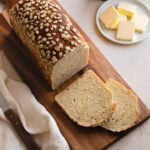Soft Sourdough Oatmeal Sandwich Bread Recipe
Soft and hearty Sourdough Oatmeal Sandwich Bread perfect for peanut butter and jelly or turkey sandwiches. Oatmeal porridge keeps bread moist for days.
Servings: 16 Slices
Calories: 147kcal
Equipment
- 9 by 4-inch Pullman pan
Ingredients
Oat Porridge
- 25 grams old-fashioned oats
- 50 grams whole milk
- 125 grams water
Dough
- 250 grams all-purpose flour
- 100 grams bread flour
- 50 grams whole wheat flour
- 100 grams active sourdough starter
- 150 grams whole milk
- 56 grams unsalted butter softened
- 40 grams honey
- 6 grams salt
Egg Wash
- 1 egg
- 20 grams old-fashioned oats
Instructions
- Combine oat porridge ingredients into a small saucepan and cook on medium high heat until the mixture comes to a boil. Lower the heat and continue to simmer until the oats have cooked and porridge has thickened noticeably, around 3 to 5 minutes. Your porridge will continue to thicken as it cools so you don’t want it to dry out completely as you are cooking it, set aside and allow to cool completely.25 grams old-fashioned oats, 50 grams whole milk, 125 grams water
- Once your porridge has cooled to room temperature, combine dough ingredients with porridge into a large mixing bowl. Mix with a wooden spoon or your hands, the dough will be a bit sticky at this point, once the mixture is fully combined, cover it with plastic wrap and set aside for an hour. This will allow the flour to hydrate fully, making your dough less sticky and easier to work with.250 grams all-purpose flour, 100 grams bread flour, 50 grams whole wheat flour, 100 grams active sourdough starter, 150 grams whole milk, 56 grams unsalted butter, 40 grams honey, 6 grams salt
- After your dough rests, turn it out onto a lightly floured work surface and knead for 10 minutes. Round the dough into a tight ball and place it into a clean, lightly oiled container. Cover and allow the dough to rest for an additional 30 minutes. Repeat the kneading and resting periods one or two more times depending on how your dough feels. Your dough is ready once it feels strong, only slightly sticky and passes the windowpane test
- Place the dough back into the oiled container, cover and allow the dough to ferment in a warm spot (78 F/25 C) until the dough has doubled, this can take anywhere from 4 to 6 hours.
- Once bulk fermentation has completed, knock the air out of your dough, round it tightly into a ball, return it to your container and place it in the refrigerator overnight.
- The next day, line your loaf pan with parchment paper. Take your dough out of the refrigerator, turn it out onto a lightly floured surface and flatten it into a 7 by 5 inch rectangle, the top and the bottom of the rectangle should be shorter than its sides. Fold down the top corners of the dough towards the middle (your dough should look like a house). Then, gently roll the top towards the center pressing down to seal. Repeat this two more times until your dough has formed a log, seal the seam.
- Place oats on a plate, brush the top of your dough with egg wash. Gently pick up your dough and roll the top of it onto the oats. Place your dough seam side down into your loaf pan, wrap the loaf pan with a plastic bag (clean grocery bags work great). Allow your dough to rise at room temperature for 2 to 4 hours, the dough should fill your tin, it is ready to bake once it has grown noticeably (almost reaching the top of your pullman pan, if you are using one).1 egg, 20 grams old-fashioned oats
- Once your dough is close to being ready, preheat your oven to 350 F/176 C and bake for 35 to 40 minutes or until it is golden brown and the center registers at 190 F/87 C when measured with an instant read thermometer.
- Remove the baked loaf from the oven and turn it out of the pan onto a wire rack to cool. Allow the loaf to cool completely, about 2 hours before slicing.
Notes
When in doubt, use gram over volume measures.
Nutrition
Calories: 147kcal | Carbohydrates: 24g | Protein: 4g | Fat: 4g | Saturated Fat: 2g | Polyunsaturated Fat: 0.3g | Monounsaturated Fat: 1g | Trans Fat: 0.1g | Cholesterol: 9mg | Sodium: 152mg | Potassium: 65mg | Fiber: 1g | Sugar: 3g | Vitamin A: 108IU | Vitamin C: 0.01mg | Calcium: 22mg | Iron: 1mg
